

NCETM Twitter chats #mathscpdchat every Tuesday from 7pm to 8pm. These weekly, Twitter-based chats are designed to engage UK maths teachers of all age-groups – including, of course, primary and trainee teachers – as well as all maths education professionals involved in helping teachers with their initial and ongoing professional learning.
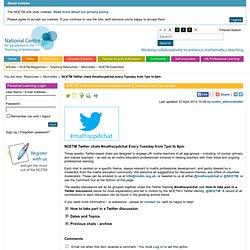
Each chat is centred on a specific theme, always relevant to maths professional development, and gently steered by a moderator from the maths education community. We welcome all suggestions for discussion themes, and offers of volunteer moderators. These can be emailed to us at info@ncetm.org.uk, or tweeted to us at either @mathscpdchat or @NCETM, or use the Comment box at the bottom of this page. The weekly discussions will all be grouped together under the Twitter hashtag #mathscpdchat (see How to take part in a Twitter discussion below for more explanation) and set in motion by the NCETM’s Twitter identity, @NCETM. Selected Quotes from Speaking Mathematically. The Beaufort Wind Scale - why we need an observation revolution.
Before technology bled the last drop of romance from navigation, sailors used the Beaufort Wind Force Scale to measure wind speed.

Without instruments to accurately measure conditions, mariners resorted to subjective value judgements - ‘rowdy seas’, ‘stiff breeze’ etc - that varied from ship to ship. In 1805 Admiral Francis Beaufort devised an elegant and beautiful standard which used a clever trick to avoid the ambiguity: he described the effect that each level of wind or storm had on the sail of a man-o-war (the most common ship at the time). This ranged from 0 (dead calm) to 12 (that which no canvas could withstand). Adjusted, extended and sometimes still used (fans of Radio 4 will be used to catching up with the weather conditions inf the Orkneys) it was a way to gauge something as wild as the wind without codifying it. Rather than bottle lightning, Beaufort simply described it. Part of the problem lies with the nature of our job. And this is true. Outstanding teaching and great teachers – a whole school CPD approach.
In September 2011 our self-evaluation judgement – that we were an outstanding school with outstanding teaching and learning – was confirmed by Ofsted.
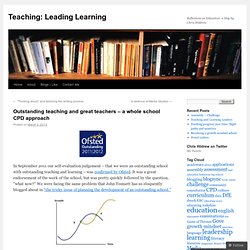
It was a great endorsement of the work of the school, but was pretty quickly followed by the question, “what now?” We were facing the same problem that John Tomsett has so eloquently blogged about in “the tricky issue of planning the development of an outstanding school.” Our priority – as at Huntingdon – is to keep the main thing the main thing and continue to develop our outstanding teaching and learning.
Giving Students Meaningful Work:Seven Essentials for Project-Based Learning. National Curriculum consultation - framework. Support staff ideas. Motivational Dialogue. Skills.

Using Low Threshold High Ceiling Tasks in Ordinary Classrooms. Using low threshold high ceiling tasks in ordinary classrooms We're not sure if we invented it*, but here at NRICH the phrase 'Low threshold, high ceiling' (LTHC) has certainly become one of our favourites.
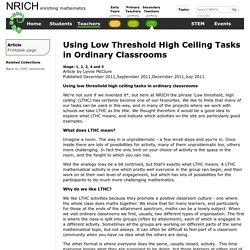
We like to think that many of our tasks can be used in this way, and in many of the projects where we work with schools we take LTHC as the title. We thought therefore it would be a good idea to explore what LTHC means, and indicate which activities on the site are particularly good examples. What does LTHC mean? Imagine a room. Well the analogy may be a bit contrived, but that's exactly what LTHC means.
Encouraging Primary Children to Work Systematically. We may well find ourselves saying to children "Be systematic!
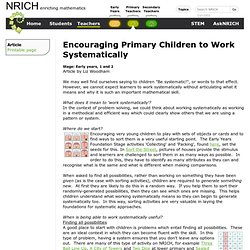
", or words to that effect. However, we cannot expect learners to work systematically without articulating what it means and why it is such an important mathematical skill. Two Heads Are Better Than One - talking. When I was at school and, in fact, when I started teaching, maths was a subject which was expected to be done in silence.

Talking about it was considered 'cheating'. Thus, almost exam conditions were expected in every lesson. This was not, I think, conducive of sound learning. Today, many teachers, especially primary teachers, aim for that wonderful sound of 'Classroom buzz', of learners on subject, discussing the task in hand. There are many ways of communicating, some more exact and useful in mathematical learning than others. Some years ago P. Integrating Rich Tasks - Introduction. This series of professional development resources is designed to support teachers working together, thinking about, and integrating rich tasks into classroom practice.
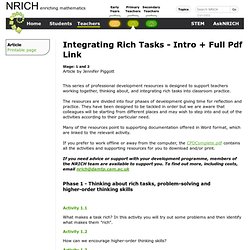
The resources are divided into four phases of development giving time for reflection and practice. Ofsted, Outstanding Teaching and the iPad. If OFSTED were to walk into a lesson tomorrow they would see the following: Prior to the lesson students would have viewed an 8-10 min screencast introducing the topic.
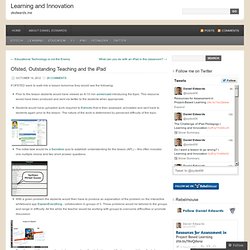
This resource would have been produced and sent via twitter to the students when appropriate.Students would have uploaded work required to Edmodo that is then assessed, annotated and sent back to students again prior to the lesson. The nature of the work is determined by perceived difficulty of the topic. The initial task would be a Socrative quiz to establish understanding for the lesson (AFL) – this often includes one multiple choice and two short answer questions.